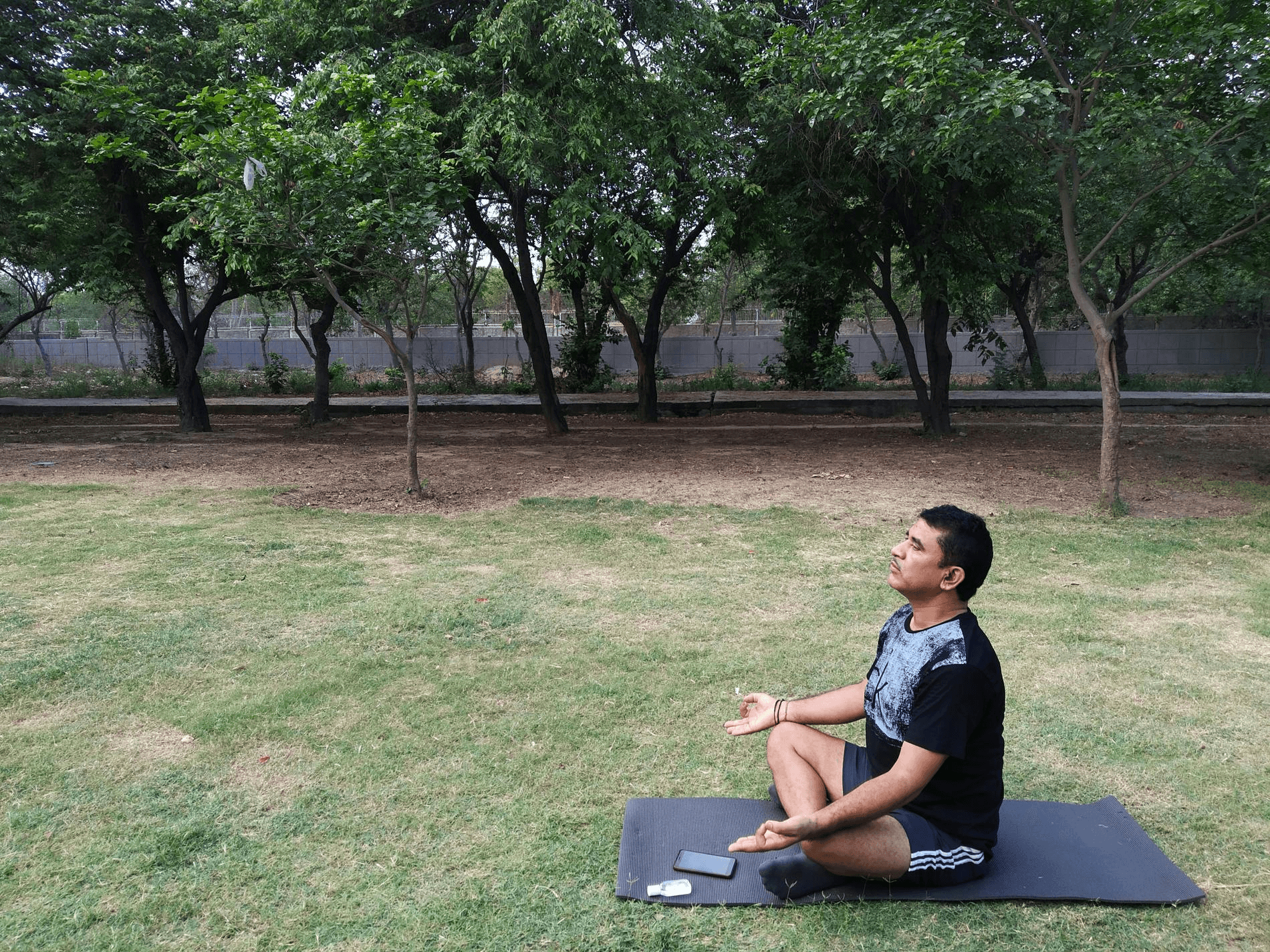
Guided Meditation for Vipassana for Busy People
Embarrassment is one of those emotions that can stop us in our tracks, replaying awkward moments over and over in our minds long after they've passed. This guided meditation for feeling embarrassment offers a gentle, compassionate approach to working with this uncomfortable emotion. Rather than trying to push embarrassment away or pretend it doesn't exist, this practice helps you develop a healthier relationship with these feelings, transforming shame and self-judgment into self-acceptance and inner peace.
When we experience embarrassment, our natural tendency is often to ruminate, criticize ourselves, or withdraw from others. This meditation provides a safe space to acknowledge these feelings without being overwhelmed by them, helping you cultivate the emotional resilience needed to move forward with grace and confidence.
Embarrassment is a complex emotion that often combines feelings of shame, self-consciousness, and social anxiety. It typically arises when we perceive that we've made a mistake, violated social norms, or been exposed in some way that feels vulnerable. While embarrassment is a normal human emotion, it can become problematic when we get stuck in cycles of self-criticism and rumination.
Guided meditation for embarrassment works by creating space between you and the emotion itself. Instead of being consumed by embarrassing thoughts or memories, you learn to observe them with curiosity and compassion. This practice draws on principles from mindfulness meditation, helping you recognize that embarrassment, like all emotions, is temporary and doesn't define your worth as a person.
The meditation typically involves techniques such as mindful breathing, body awareness, and loving-kindness practices. These approaches help activate your parasympathetic nervous system, reducing the fight-or-flight response that often accompanies embarrassment. By learning to stay present with uncomfortable feelings rather than avoiding them, you develop greater emotional intelligence and resilience.
Reduces Self-Criticism and Shame: One of the primary benefits of this practice is its ability to soften the harsh inner voice that often accompanies embarrassment. Through compassionate awareness, you learn to treat yourself with the same kindness you would offer a good friend. This shift from self-judgment to self-compassion can significantly reduce the intensity and duration of embarrassing feelings.
Builds Emotional Resilience: Regular practice with managing emotions through meditation strengthens your ability to bounce back from uncomfortable social situations. Instead of being derailed by embarrassment for days or weeks, you develop the skills to process these feelings more quickly and move on with greater ease.
Improves Social Confidence: As you become more comfortable with the possibility of embarrassment, you naturally become more willing to take social risks and engage authentically with others. This increased confidence stems from knowing you can handle whatever emotions arise, including embarrassment, without being overwhelmed by them.
Enhances Present-Moment Awareness: Embarrassment often involves dwelling on past events or worrying about future judgment from others. This meditation practice helps anchor you in the present moment, where you can respond to situations more skillfully rather than reacting from old patterns of shame and self-consciousness. The mindfulness techniques used in this practice can be particularly helpful for breaking free from ruminating thoughts.
Research in psychology has shown that mindfulness-based interventions can significantly reduce symptoms of social anxiety and shame, which are closely related to embarrassment. Studies indicate that people who practice mindfulness meditation report greater emotional regulation and less reactivity to socially challenging situations. This practice can be especially beneficial when combined with other anxiety and stress management techniques, creating a comprehensive approach to emotional well-being.

Listen to this practice and transform embarrassment into self-compassion
Find more practices like this one in our free guided meditation app Declutter The Mind.
Explore libraryLearning to practice this meditation independently will give you a valuable tool for managing embarrassment whenever it arises. The key is approaching these uncomfortable feelings with curiosity rather than resistance, allowing them to be present while maintaining your sense of inner stability.
1. Find Your Meditation Position: Sit comfortably with your back straight but not rigid. You can sit in a chair with your feet flat on the floor or cross-legged on a cushion. Rest your hands gently on your thighs or in your lap. If sitting feels uncomfortable, you can also practice lying down without falling asleep by keeping your legs uncrossed and arms at your sides.
2. Begin with Breath Awareness: Close your eyes or soften your gaze downward. Take three deep, conscious breaths, allowing each exhale to release any tension you're holding. Then let your breath return to its natural rhythm, simply observing the sensation of breathing without trying to change it.
3. Acknowledge the Embarrassment: Gently bring to mind the situation or memory that's causing embarrassment. Notice what arises in your body and mind—perhaps tension in your chest, heat in your face, or racing thoughts. Instead of pushing these sensations away, say to yourself, "I notice embarrassment is here" or "This is what embarrassment feels like."
4. Locate the Physical Sensations: Scan your body to identify where embarrassment is manifesting physically. Common areas include the face, neck, chest, and stomach. Breathe into these areas, imagining your breath creating space around the sensations rather than trying to make them disappear.
5. Practice Self-Compassion: Place one or both hands on your heart and offer yourself kind words. You might say, "Everyone experiences embarrassment," "This feeling will pass," or "I am worthy of love and acceptance, even when I make mistakes." Speak to yourself as you would comfort a dear friend going through the same experience.
6. Expand Your Awareness: Gradually widen your attention beyond the embarrassment to include your entire experience. Notice sounds around you, the feeling of air on your skin, or the support of the chair or cushion beneath you. This helps prevent you from becoming completely consumed by the embarrassing thoughts or memories.
7. Close with Intention: Before ending your practice, set an intention for how you want to carry this sense of self-compassion into your day. You might choose to be gentler with yourself, more willing to take social risks, or simply more present when difficult emotions arise.
Start Small: If you're new to meditation, begin with just 5-10 minutes of practice. You can gradually extend the duration as you become more comfortable with the technique. Even brief sessions can be effective for processing embarrassment, especially when practiced consistently.
Use Gentle Curiosity: Approach embarrassing thoughts and feelings like a scientist observing an interesting phenomenon. Ask yourself, "What does this feel like?" or "Where do I notice this in my body?" This curious stance helps create distance from overwhelming emotions while still acknowledging them fully.
Practice Regularly: The most powerful aspect of this meditation isn't necessarily what happens during embarrassing moments, but the resilience you build through consistent practice. Even practicing when you're feeling calm helps strengthen your capacity to handle difficult emotions when they arise.
Be Patient with Resistance: It's natural for your mind to want to avoid embarrassing memories or feelings. When you notice resistance, simply acknowledge it: "I notice I'm trying to push this away." Then gently return to your breath and the practice of compassionate awareness.
During your meditation, you might experience a range of responses. Initially, focusing on embarrassing situations may intensify the feelings temporarily—this is completely normal. Your body and mind are processing emotions that may have been suppressed or avoided. You might notice physical sensations like warmth, tension, or butterflies in your stomach.
Some people experience emotional releases during practice, such as tears or unexpected memories surfacing. These responses indicate that the meditation is working, helping you process stored emotional energy. Remember that all reactions are valid and part of the healing process.
You might also find your mind wandering to other worries or completely unrelated thoughts. This is typical in any meditation practice. When you notice your attention has drifted, simply guide it back to your breath and the present moment without judgment. This gentle redirection is actually strengthening your mindfulness skills.
When Embarrassment Feels Overwhelming: If the emotions become too intense during practice, you can always return to focusing solely on your breath or physical sensations like your feet on the floor. You might also try the 4-7-8 breathing technique to activate your body's relaxation response. Remember, you're in control and can always take a break if needed.
When Your Mind Keeps Racing: Embarrassment often triggers repetitive thoughts about what others might think or how things could have gone differently. When you notice your mind spinning, acknowledge these thoughts without engaging with their content. You might mentally note "thinking" and return to your breath, treating thoughts like clouds passing through the sky of your awareness.
When You Feel Resistant to Self-Compassion: Many people find it difficult to offer themselves kindness, especially when they feel they've done something embarrassing. If loving-kindness phrases feel forced or untrue, start with neutral statements like "May I be safe" or "May I find peace." You can also imagine offering compassion to someone else in a similar situation, then gradually extending that same kindness to yourself.
Consistent practice with embarrassment meditation builds what psychologists call emotional resilience—your capacity to recover from difficult experiences and adapt to challenges. This doesn't mean you'll stop feeling embarrassed, but rather that you'll develop a healthier relationship with these inevitable human experiences.
Over time, you may notice that embarrassing situations don't throw you off balance as much or for as long. You might find yourself able to laugh at mistakes more easily or engage in social situations with greater confidence, knowing you can handle whatever emotions arise. This increased emotional flexibility often extends beyond embarrassment to other challenging feelings as well.
Many practitioners find that regular meditation helps them develop what researchers call "meta-cognitive awareness"—the ability to observe their thoughts and emotions rather than being completely identified with them. This skill is particularly valuable for working with social anxiety and other interpersonal challenges that often accompany embarrassment.
Find more practices like this one in our free guided meditation app Declutter The Mind. The app includes dozens of meditations specifically designed for working with difficult emotions, building confidence, and developing greater self-compassion. You'll also find related practices for self-love, confidence, and anxiety that can complement your work with embarrassment.
Remember that learning to work skillfully with embarrassment is a practice, not a destination. Each time you choose to meet these feelings with awareness and compassion rather than avoidance or self-criticism, you're strengthening your capacity for emotional freedom and authentic self-expression. Be patient with yourself as you develop these skills, and celebrate the courage it takes to face uncomfortable emotions with such openness and care.
Learn about more guided meditation practices to help you build more mindfulness, manage emotions, and improve your overall mental health and well-being.